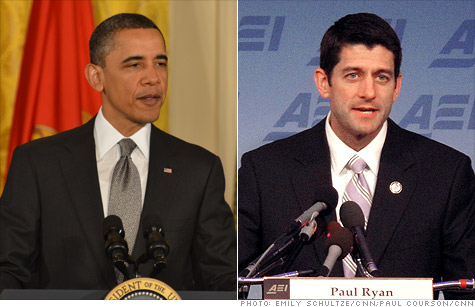Sunday, March 25, 2012
Budget battle
If you haven't heard about the budget battle looming between the Republicans and their House Leader, Paul Ryan,1 and the Democrats and the President, Barack Obama, get ready to.2

With the Great Recession drifting along, the economy sputtering, stagflation a reality and deflation a specter still looming, the Presidential race will be almost exclusively about the economy. And there is no starker way to delineate the contrasts between the Republicans and the Democrats than the priorities and concerns their respective budgets demonstrate.3
As Derek Thompson, a senior editor at The Atlantic, so eloquently puts it, "Budgets are statements of values. They tell us what our leaders think is important for the country." Thompson argues effectively that Representative Ryan's Republican budget is designed to cut the Federal government back in a manner that would have made Ronald Reagan and Barry Goldwater proud. Ryan's budget is lowers taxes on the rich and big corporations, while attempting recoup some of that revenue by reducing the complexity of the tax code. Further saving are found in repealing Obamacare and cutting Medicaid, along with shrinking non-defense discretionary spending.4
The Obama budget protects the President's massive health care program, along with Medicaid and the State Children's Health Insurance Program (SCHIP). Unfortunately, certain elements read like pure fantasy, as Thompson puts it, "It pays for new infrastructure projects with 'savings from the Iraq war,' which... is a clever bit of parallel-universe budgeting, like me paying for a new suit with 'savings from not going to Atlantic City tomorrow'."
The President's budget also protects the 99%. Well at least 98% of them anyway, by excluding them from tax hikes specifically targeting the rich. Of course, as veteran observers of Washington and the tax code know, the uber-rich have armies of attorneys to help them minimize and evade their tax obligations.5,6
Like most, the Clarion Content finds it far easier to complain about both these budget proposals, than to offer real tangible solutions. Here's to hoping the politicians can do better than they have been these last fifteen years.
Notes
1If the Republicans somehow end up with a brokered convention, this is the man most likely to come off the back benches and grab the nomination.
2Older readers, you will likely be as sick of this budget debate as you once were the phrase "Social Security lockbox" during the Bush II vs. Gore debacle of 2000.
3It is relevant to note this is, in part, because Barack Obamas's foreign policy has essentially been a continuation of the Bush II-Cheney regime's American exceptionalism justifies American overreach.
4Still waiting for the Air Force's first Bomber bake sale.
5Unless you believe the Caymans and the Bahamas are legitimate modern nation-states, not extra-judicial tax havens that would be far easier to invade and conquer than Iraq or Afghanistan.
6Plenty of evidence suggests increased tax code complexity actually makes it easier for the rich to avoid paying their tax obligations.

With the Great Recession drifting along, the economy sputtering, stagflation a reality and deflation a specter still looming, the Presidential race will be almost exclusively about the economy. And there is no starker way to delineate the contrasts between the Republicans and the Democrats than the priorities and concerns their respective budgets demonstrate.3
As Derek Thompson, a senior editor at The Atlantic, so eloquently puts it, "Budgets are statements of values. They tell us what our leaders think is important for the country." Thompson argues effectively that Representative Ryan's Republican budget is designed to cut the Federal government back in a manner that would have made Ronald Reagan and Barry Goldwater proud. Ryan's budget is lowers taxes on the rich and big corporations, while attempting recoup some of that revenue by reducing the complexity of the tax code. Further saving are found in repealing Obamacare and cutting Medicaid, along with shrinking non-defense discretionary spending.4
The Obama budget protects the President's massive health care program, along with Medicaid and the State Children's Health Insurance Program (SCHIP). Unfortunately, certain elements read like pure fantasy, as Thompson puts it, "It pays for new infrastructure projects with 'savings from the Iraq war,' which... is a clever bit of parallel-universe budgeting, like me paying for a new suit with 'savings from not going to Atlantic City tomorrow'."
The President's budget also protects the 99%. Well at least 98% of them anyway, by excluding them from tax hikes specifically targeting the rich. Of course, as veteran observers of Washington and the tax code know, the uber-rich have armies of attorneys to help them minimize and evade their tax obligations.5,6
Like most, the Clarion Content finds it far easier to complain about both these budget proposals, than to offer real tangible solutions. Here's to hoping the politicians can do better than they have been these last fifteen years.
Notes
1If the Republicans somehow end up with a brokered convention, this is the man most likely to come off the back benches and grab the nomination.
2Older readers, you will likely be as sick of this budget debate as you once were the phrase "Social Security lockbox" during the Bush II vs. Gore debacle of 2000.
3It is relevant to note this is, in part, because Barack Obamas's foreign policy has essentially been a continuation of the Bush II-Cheney regime's American exceptionalism justifies American overreach.
4Still waiting for the Air Force's first Bomber bake sale.
5Unless you believe the Caymans and the Bahamas are legitimate modern nation-states, not extra-judicial tax havens that would be far easier to invade and conquer than Iraq or Afghanistan.
6Plenty of evidence suggests increased tax code complexity actually makes it easier for the rich to avoid paying their tax obligations.
Labels: 2012 presidential election, Economy, Politics
Comments:
Post a Comment